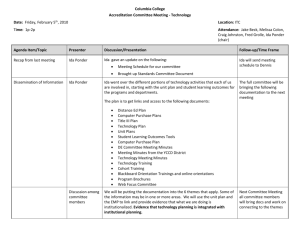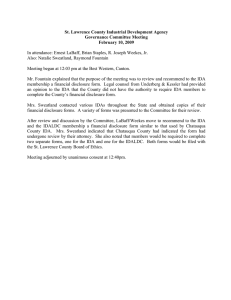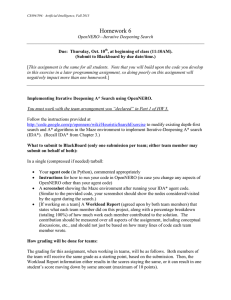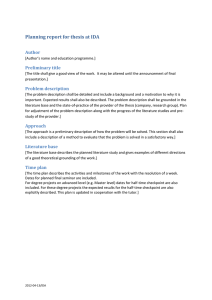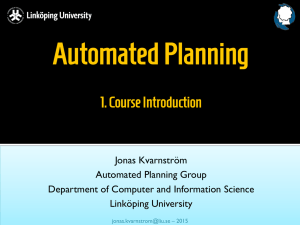Automated Planning Course Introduction
advertisement
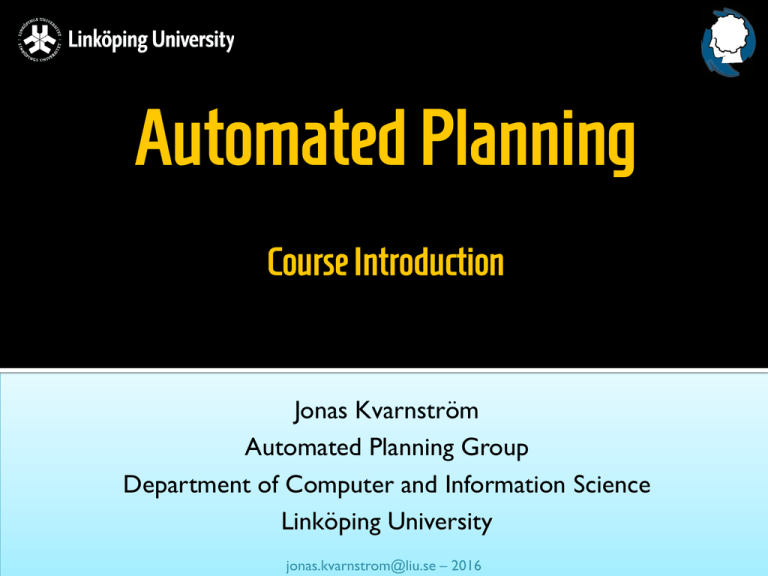
Automated Planning Course Introduction Jonas Kvarnström Automated Planning Group Department of Computer and Information Science Linköping University jonas.kvarnstrom@liu.se – 2016 Lecturer: Jonas Kvarnström (jonas.kvarnstrom@liu.se) Computer Science (C program) in Linköping 1992–1996 PhD, now assistant professor (universitetslektor) Leader of the Automated Planning group Lab Assistant: Mikael Nilsson (mikael.a.nilsson@liu.se) – Ph.D. student in planning Administration: Anna Grabska Eklund (anna.grabska.eklund@liu.se) – LADOK, … 2 jonkv@ida About Us… Please interrupt! Questions and comments are welcome – start a dialog! 3 jonkv@ida About the Lectures… Today's lecture: Introduction to the course ▪ Contents ▪ Examination ▪ Timetables Definition and discussion of the topic ▪ Deciding which actions to use in order to achieve an objective ▪ Distinction: Planning vs. reacting ▪ Distinction: Domain-specific vs. domain-independent ▪ Distinction: Levels of expressivity; classical planning 5 jonkv@ida Today's Lecture 7 Prerequisites Basic knowledge and understanding of data structures and algorithms as well as logic and discrete mathematics. Knowledge and understanding of basic artificial intelligence techniques and concepts, including search, heuristics and the A* search algorithm. Essentially no planning knowledge required! We will introduce planning concepts Then we will quickly go much deeper jonkv@ida Prerequisites 8 Course Contents Theory How do we model and specify planning problems? How do planning algorithms work? How do they relate to and benefit from different plan structures? How can planners benefit from our own deeper domain knowledge? Practice Practical experience in modeling / solving planning problems using well-known planners Deeper understanding of abilities and limitations How can we handle uncertainty? Written Exam Demos, hand-ins jonkv@ida Course Contents 9 Preliminary lecture contents (the order may differ): Introduction ▪ To the course ▪ To planning ▪ To modeling and describing planning problems ▪ To formal models for planning Classical Planning Techniques ▪ Thinking forwards: State space search and heuristics (relaxations, landmarks, pattern DBs, …) ▪ Thinking backwards: Regression planning ▪ Thinking in all directions: Partial-order planning Neo-classical Planning Techniques: Thinking differently ▪ Planning graphs ▪ Propositional satisfiability planning Domain-configurable Planning Techniques: Thinking together ▪ Planning with control formulas ▪ Hierarchical Task Networks Probabilistic planning Path planning jonkv@ida Lecture Contents Main course book Reading instructions are on the web 10 jonkv@ida Course Book Lectures vs. Course Book Some overlap, but… 11 Lectures: Overviews Intuitions Details suitable for slides Complementary: Use both! (The exam will…) Book: Different overviews, intuitions Additional content and details Larger examples Exercises, questions jonkv@ida Lectures vs. Course Book 12 Rapid progress in planning research! Six labs based on state of the art research prototypes Dozens of planners are available ▪ Some ”recommended”, others available as a bonus Sequential satisficing acoplan acoplan2 arvand brt cbp cbp2 cpt4 dae_yahsp fd-autotune-1 fd-autotune-2 fdss-1 fdss-2 forkuniform lama-2008 lama-2011 lamar lprpgp madagascar madagascar-p popf2 probe randward roamer satplanlm-c sharaabi yahsp2 yahsp2-mt Seq. sat. multi-core acoplan arvandherd ayalsoplan madagascar madagascar-p phsff roamer-p yahsp2-mt Seq. optimizing bjolp cpt4 fd-autotune fdss-1 fdss-2 forkinit gamer iforkinit lmcut lmfork merge-and-shrink selmax Temporal satisficing cpt4 dae_yahsp lmtd popf2 sharaabi tlp-gp yahsp2 yahsp2-mt Older planners IPP FF Specialized planners SHOP2 jonkv@ida Labs Classical planning 1. Construct a simple planning domain for emergency service assistance Investigate properties of several planners Classical planning 2. Extensions – learn more about modeling Use action costs to model plan quality Test optimal planners Planning for multiple agents 3. Using sequential planners – what happens? Using concurrent planners – what do you gain? How do you model? 13 jonkv@ida Lab Overview Hierarchical Task Networks 4. Defining tasks to perform instead of goals to achieve Very different modeling task! Planning with Control Formulas 5. Using our own domain knowledge to guide a search algorithm Motion Planning with OMPL 6. Test a variety of motion planning techniques using the Open Motion Planning Library 14 jonkv@ida Lab Overview (2) Work by yourselves or in pairs Working in pairs must work together! Register in WebReg ASAP If you have a problem: First try to solve it yourselves Then ask us! Without feedback we can’t help you! Be at the scheduled labs Even though you can work at home! Work outside the scheduled hours 15 jonkv@ida Labs 16 Approximate timeline: 160411 – Finish lab 1 (Classical 1) Lab assistant available: 160421 – Finish lab 2 (Classical 2) During scheduled lab hours 160428 – Finish lab 3 (Concurrent) By e-mail, 160504 – Finish lab 4 (HTN) 160512 – Finish lab 5 (TLPlan) until the demo session 1606xx (That's all!) 160519 – Finish lab 6 (OMPL) 160526 – Final lab session, catch up and finish… Absolute deadlines: 160604 – Written exam 1606xx – Bonus demo session in the re-exam period (date announced later) jonkv@ida Schedule 17 General policy: You can always take an exam at least three times per year For this course, you can also take the exam: ▪ In the August 2016 re-exam period ▪ In the October 2016 re-exam period General policy: For all IDA courses having computer lab assignments there will be one deadline during or at the end of the course. If you fail to make the deadline, you must retake the possibly new lab course the next time the course is given. For this course, three bonus demo sessions: ▪ In the June 2016 re-exam period ▪ In the August 2016 re-exam period ▪ In the October 2016 re-exam period jonkv@ida Additional Opportunities 18 jonkv@ida Strict Deadlines! 19 Do you need money from CSN? Finish in time, study for the exam! You can only recieve credits on the specified dates jonkv@ida Strict Deadlines! 2 20 Will you be leaving the country? Study for the exam! You can not take an exam without being here jonkv@ida Strict Deadlines! 3 TDDD48 Automated Planning Questions?
